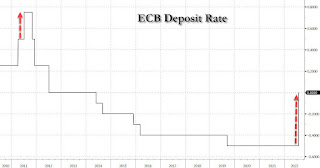--Jaime Escalante (Stand and Deliver)
Negative interest rate policies (NIRP) enacted by central banks across the globe in the middle of last decade spawned a mountain of negative interest-bearing debt. It was hard to imagine who was buying it although, in reality, central banks themselves were hoovering much of it up as part of their quantitative easing (QE) programs.
The worm has turned dramatically as inflation has picked up and CBs are now raising rates. After hitting a peak of about $17 trillion in 2020, negative yielding debt has plummeted to less than $2 trillion. Most of that decline has come since the beginning of 2022.
As NIRP debt declines, it seems likely that broken conventional discounting processes get repaired.
Central banks become extra big losers as NIRP reverses. They bought $trillions of negative yielding bonds that have now been pounded as rates rise and bond prices fall. Many CBs are approaching the broke point on paper.
While these institutions can simply print more money out of thin air to rectify their upside down balance sheets, this would create quite the paradox of creating more money in an inflationary environment.




















![[Most Recent Quotes from www.kitco.com]](http://www.kitconet.com/charts/metals/gold/t24_au_en_usoz_2.gif)


